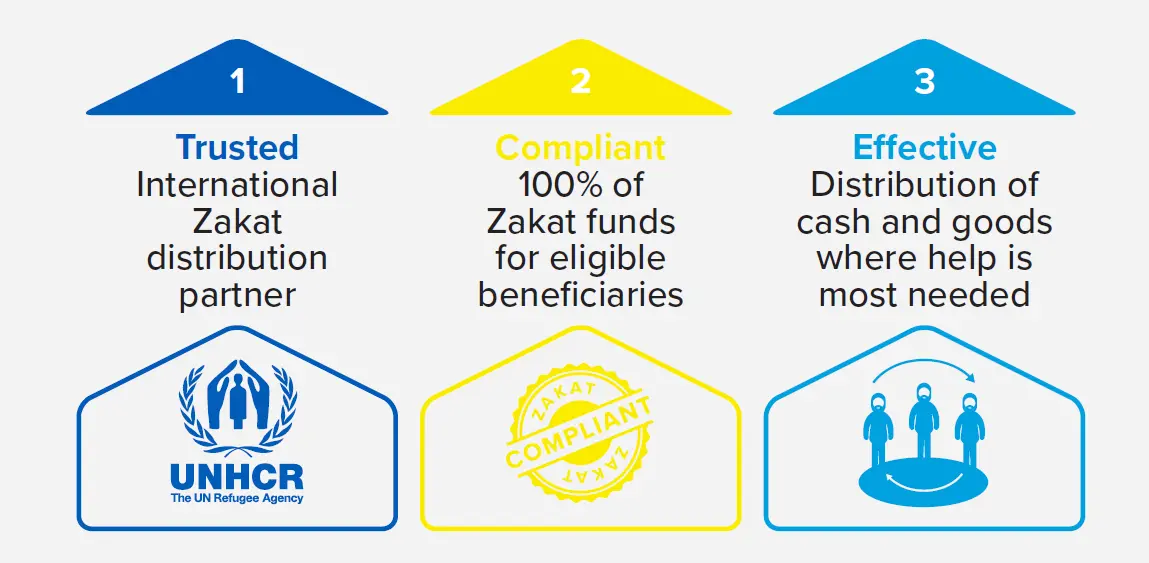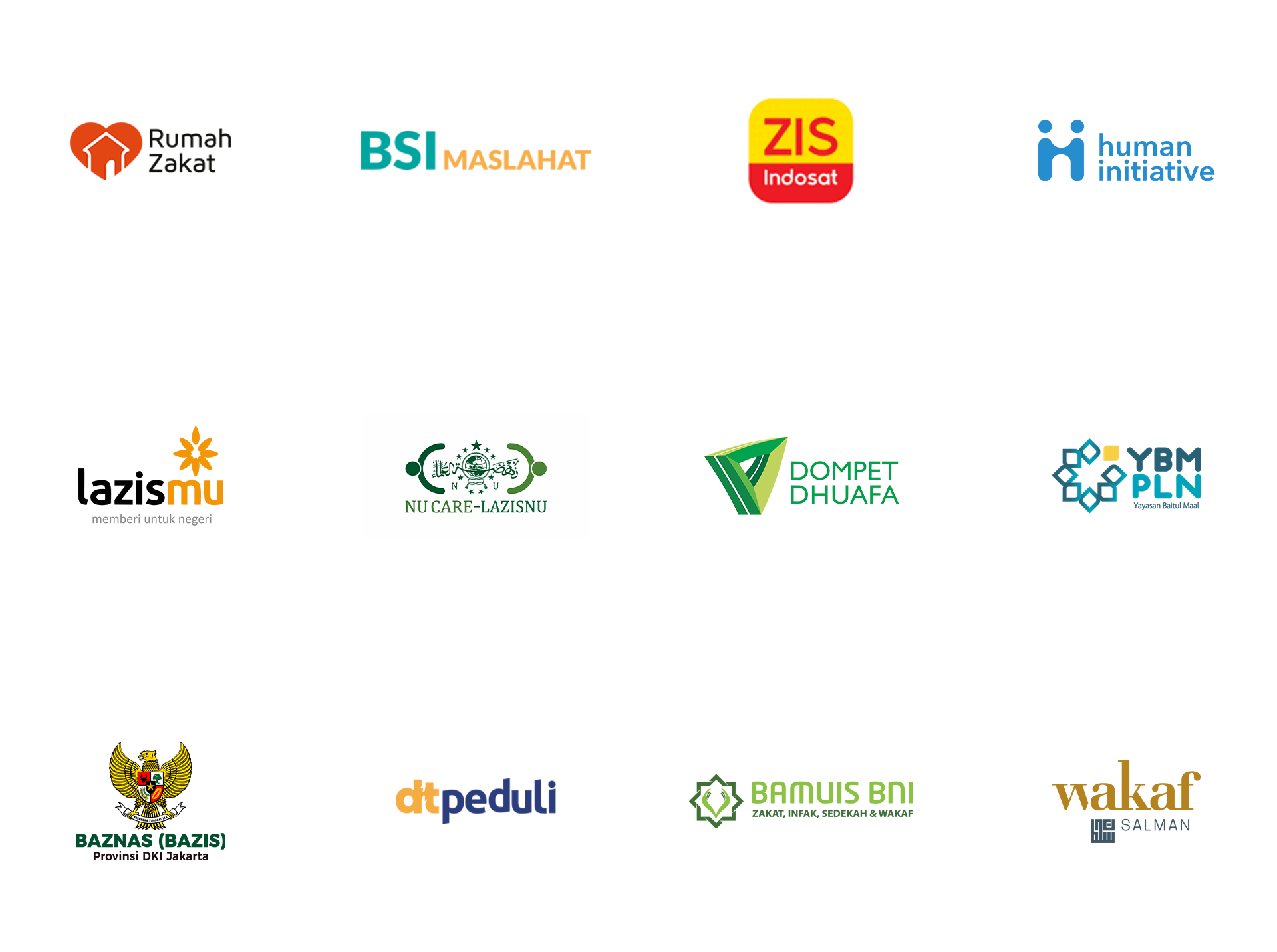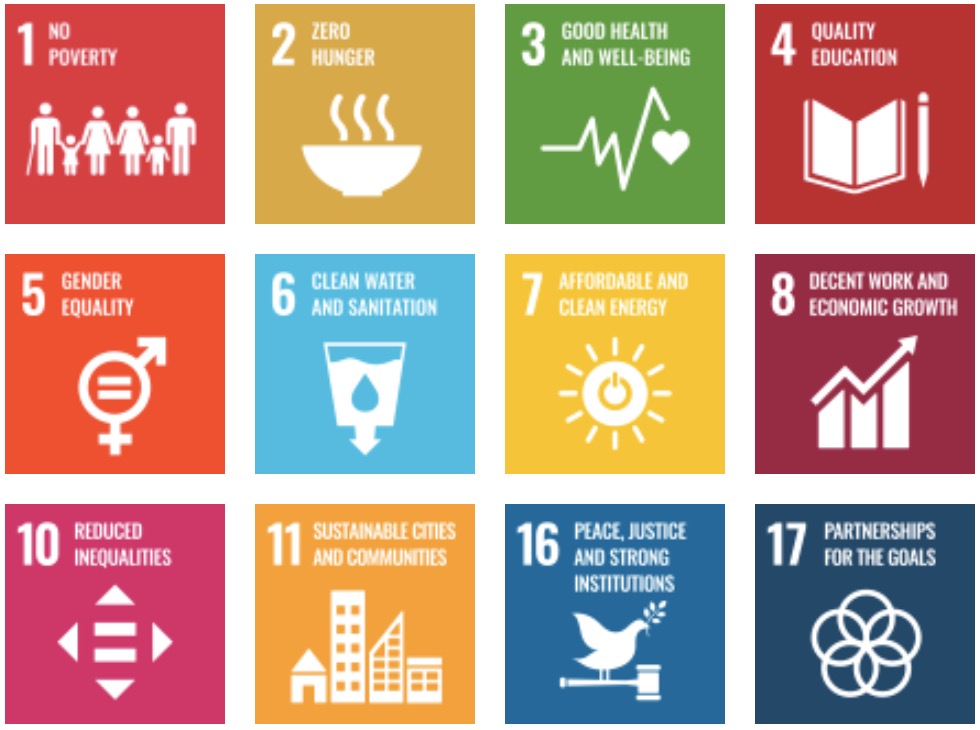Learn more about the UNHCR Islamic Philanthropy program and our supporters
UNHCR’s Islamic Philanthropy program in Indonesia works with a range of supporters and partners from Islamic charities, Islamic foundations and Sharia businesses to assist refugees and other people forcibly displaced. UNHCR Indonesia does not collect Zakat directly, but partners with Zakat agencies and other Islamic charities to support people forced to flee through our program.
Why Islamic Philanthropy at UNHCR?

Credible. Sharia Compliant. Effective.
UNHCR’s Islamic Philanthropy is a trusted, compliant and effective distributor maximizing the power of Islamic Social Funding to transform the lives of refugees, including in hard-to-reach areas.
UNHCR ensures 100% of Zakat contributions funds are distributed to those most in need, by covering overhead costs from non-Zakat sources, to guarantee that 100% of Zakat contributions are given to the most vulnerable, Zakat-eligible recipients in critical need.
Islamic Philanthropy has emerged as a crucial component in responding to the global displacement crisis. With more than 100 million people now forcibly displaced around the world, there is a pressing demand for creative solutions that can help meet the urgent and growing humanitarian and development needs that arise as a result.
Islamic Philanthropy provides a lifeline to millions of refugees, internally displaced persons (IDPs), and host communities globally. In 2023, partners and donors from Islamic Philanthropy that generously contributed to UNHCR, enabled us to support almost 2 million refugees and IDPs in 23 countries. Significant donations from partners such as Qatar Charity, Qatar Red Crescent, the Muslim World League and the Zakat House of Kuwait, and through UNHCR’s Ramadan and Dhul Hijjah campaigns, have all been instrumental to this success.
Endorsements and Fatwas
Fiqh Majlis of Canada

The Fiqh Majlis of Canada is an independent non-profit organization working with Muslim Scholars of Fiqh to act as a reference for all Halal issues (food & beyond) on behalf of the Halal consumers. The Majlis’ goal is to work with all Muslims who are concerned about Halal & Haram matters, with our areas of focus including: Accreditation, Research and Training. Their endorsements include the Canadian Council of Imams, Ontario Muslim Chamber of Commerce and the Muslim Council of Peel.
Tabah Foundation

Based upon our previous report and taking into consideration new fatwas from Dr Sheikh Ali Gomaa and The Fatwa Council of Tareem, Tabah approves UNHCR’s plan to distribute goods in place of cash provided that UNHCR can show that goods are purchased at a fair market price, and proof of delivery of said goods. Additionally, UNHCR may use Zakat to cover charges related to the storage and transport of said goods. This arrangement is only recommended in locations where the need for in-kind distribution is higher than cash distribution, or when distributing cash isn’t possible, which is the case for UNHCR’s operation for Rohingya refugees in Bangladesh.
Sheikh Abdullah bin Bayya

Sheikh Abdullah bin Bayya is a renowned scholar from Mauritania. Sheikh Abdullah bin Bayya is the Chairman of the UAE’s Fatwa Council, and an instructor at King Abdulaziz University in Jeddah.
Dr Sheikh Ali Gomaa

Dr. Sheikh Ali Gomaa is the former Grand Mufti of the Arab Republic of Egypt and professor of Islamic jurisprudence at Al-Azhar University. He is currently a member of Al-Azhar’s Council of Senior Scholars.
The Fatwa Council of Tareem

The Fatwa Council of Tareem is located in Hadramaut, Yemen. Hadramaut has been a major centre for scholarship for over a millennium and has produced many of the world’s leading Shafi’i scholars.
Muslim World League

The Muslim World League (based in the Holy City of Mecca, Kingdom of Saudi Arabia) was established in 1962 following a resolution adopted during a meeting of the World Muslim Congress, held in the Holy City of Mecca on 14 Dhu Al-Hijjah 1381 AH (May 18 1962 AD).
Senior Scholars’ Council

The Council of Senior Scholars of Morocco is the highest official religious authority in Morocco, and includes a fatwa council. It follows the Maliki School.
ISRA

International Shariah Research Academy (ISRA) was established in 2008 by the Central Bank of Malaysia as an Islamic finance and Shariah research institution. ISRA is recognized globally as a leading Global Premier Research Academy in the Islamic Finance industry, and has more than a decade of experience verifying and providing essential research on Islamic Finance to some of the top institutions around the world.
In February 2021, ISRA endorsed UNHCR’s Zakat collection and distribution mechanisms as Zakat-compliant. The endorsement confirms that UNHCR’s Refugee Zakat Fund meets the following criteria:
- Adherence to rules and principles on Zakat collection and distribution.
- Competency of UNHCR personnel to undertake the above responsibility.
- Adequacy of UNHCR governance structure related to Zakat collection and distribution activities.
- Transparency and disclosure by UNHCR on its Zakat collection and distribution activities.
ISRA also included additional recommendations to further improve the process of Zakat-compliance by UNHCR.
International Islamic Fiqh Academy

The International Islamic Fiqh Academy (IIFA) was created in 1981 and is located in Jeddah, KSA. It is a subsidiary of the Organisation of Islamic Cooperation (OIC), which is the largest organization representing the Muslim world with a membership of 57 states spread over four continents. The Academy’s mission is to provide religious guidance on modern legal, social, cultural and economic issues. It is an international body composed of over 65 Muslim scholars from all over the world and is as such considered one of the leading religious references for Muslims worldwide.
The Supreme Council of Imams and Islamic Affairs of Brazil

The Supreme Council of Imams and Islamic Affairs of Brazil was established in Brazil in 2005. It aims to establish a unified legal Islamic authority representing Muslims in Brazil and recognized by Brazilian authorities and by Islamic institutions from across the Muslim world. It counts over 60 clerics and preachers from different regions of the country as members.
Dar al-Ifta al-Missriyyah

Dar al-Ifta al-Missriyyah is one of Egypt’s centers for Islamic legal research. It was established in 1895 and is considered one of the earliest modern fatwa producing institutes.
Canadian Council of Imams

The Canadian Council of Imams is a collective leadership of Imams (Ministers of Religion) in Canada. Established in 1990, the Council has been serving the Canadian Muslim communities throughout the nation in different capacities as well as acting as a unifying platform for Canadian Imams and chaplains.
Al-Azhar Islamic Research Academy

The university-mosque of Al-Azhar, situated in Cairo, Egypt, is the foremost center of religious learning in the Muslim world and plays a significant intellectual role in Egypt and beyond. Al-Azhar was built in 970 as a mosque and became an institution in 1171. Al-Azhar Islamic Research Academy is the institution’s supreme body for Islamic research.
Al-Azhar Islamic Research Academy issued a fatwa in March 2021 allowing UNHCR to receive and distribute Zakat funds, highlighting that most of the Zakat categories apply to refugees and internally displaced people.
Islamic Affairs and Charitable Activities Department

Dr. Ahmed Al Haddad has served as the Grand Mufti of Dubai since 2011. He holds a PhD in Shari’a from Umm Al Qura University, Makkah, KSA. He serves as the head of Dubai’s fatwa department at IACAD and is mainly responsible for the regulation, edicts, and issuing all decisions concerning Islamic law and order in the emirate. In addition to this, he is a member to multiple Fatwa and Sharia Boards, a member of AAOIFI in Bahrain and wrote multiple books with regards to Fiqh matters. He is also an associate professor at College of Islamic Studies in Dubai and Mohamed Bin Zayed University in Ajman.
The Tri-State Imams Council

The UNHCR sent a request for a fatwa from the Tri State Imam Council regarding the permissibility of UNHCR receiving Zakat funds from Muslims from different countries of the world and distributing it to those who deserve it from among the Muslims. The Tri State Imam Council’s response is follows:
The UNHCR is a global institution that has a global trust, and is not an institution which belongs to a particular country or party as much as it is an institution for all mankind, and after reviewing and making sure that the institution follows the Sharia’s regulations for distributing Zakat, as well as having the ability to reach the needy anywhere, as well as not deducting any administrative expenses. It distributes 100% of the collected Zakat funds, so the Tri state has no objection to the UNHCR collecting and distributing Zakat funds.
Islamic Philanthropy Reports
Read UNHCR’s Islamic Philanthropy Reports, which outline the impact that Islamic Philanthropy has in supporting people who have been forced to flee their homes.
Islamic Philanthropy Partners in Indonesia
Faced with many complex challenges in recent years, UNHCR has redoubled its efforts to strengthen its partnerships with various organizations, both international and national, to maximize complementarity and sustainability in our work for refugees and others who have been forced to flee their homes. Our Islamic Philanthropy partnerships are vital in achieving these goals and the best possible outcomes by combining and leveraging resources and working together in a transparent, respectful and mutually beneficial way. In 2023, UNHCR globally partnered with more than 50 foundations, NGOs and institutions involved in Islamic Philanthropy.
We are so grateful for these partnerships in Indonesia; they each make us stronger.

Islamic Philanthropy in Achieving the SDGs

Please help refugee families in need.
Support today.
